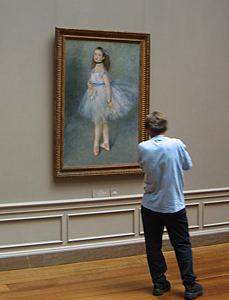 Recently, I have been reading Lewis Hyde’s absolutely brilliant book, The Gift: How the Creative Spirit Transforms the World, and today ran across two quotes that seem to speak to the events of this week.
Recently, I have been reading Lewis Hyde’s absolutely brilliant book, The Gift: How the Creative Spirit Transforms the World, and today ran across two quotes that seem to speak to the events of this week.
As we all know, this has been a period in which the Detroit Symphony Orchestra canceled the remainder of its season due to the impasse between musicians and management, and in which the House of Representatives gutted the National Endowment for the Arts as part of its version of the continuing resolution legislation necessary to avoid a government shutdown in early March.
Such moments are disconcerting, because we look for meaning as we try to frame our response. It is too big for any single one of us to handle. There is a feeling of losing direction and momentum; an interruption of life as it had been.
Perhaps that is why the quotes in this book were so powerful to me. I have been trying to make sense of these days. Why does this moment seem so threatening?
The first passage is Hyde’s own quoting of Joseph Conrad, who, in writing about the role of the artist, says:
He speaks to our capacity for delight and wonder, to the sense of mystery surrounding our lives; to our sense of pity, and beauty, and pain: to the latent feeling of fellowship with all creation – to the subtle but invincible conviction of solidarity that knits together the loneliness of innumerable hearts, to the solidarity . . . which binds together all humanity – the dead to the living and the living to the unborn.
As a musician, I stopped and reflected. Those of us living today, creating at this moment, are part of the long conversation that has occupied mankind from the very beginning. Yet the events of the past week threaten that conversation in some way, and it has taken a toll on many of us who sense that this is beyond our capacity to hold back the tide. It is as if there is a fever that has to rise, to break, and, only then subside – but at what price to all of us? What will be left after this fever has passed?
I returned to the book and, a few pages later, was stunned to read this passage written by Hyde himself:
In first introducing these two Greek terms, I said that it is bios-life – individual and embodied – that dies, while zoë-life is the unbroken thread, the spirit that survives the destruction of its vessels. But here we must add that zoë-life may be lost as well when there is wholesale destruction of its vehicles. The spirit of a community or collective can be wiped out; tradition can be destroyed. We tend to think of genocide as the physical destruction of a race or group, but the term may be aptly expanded to include the obliteration of the genius of a group, the killing of its creative spirit through the destruction, debasement, or silencing of its art…. Those parts of our being that extend beyond the individual ego cannot survive unless they can be constantly articulated. And there are individuals – all of us, I would say, but men and women of spiritual and artistic temperament in particular – who cannot survive, either, unless the symbols of zoë-life circulate among us as a commonwealth.
This is the significance of this time in our lives. The fever of the moment has the capacity to destroy, debase and silence us. The vehicles of the long conversation, what Hyde calls zoë-life, are threatened. The unbroken line can be severed in the fever of fiscal “responsibility.”
Unlike the purges of 1937 in the Soviet Union, this killing of the creative spirit is not driven by a Stalinesque need to instill fear in the hearts of his people. Instead, this genocide of our genius is justified by abstract numbers.
We are the victims, not of a dictator, but of arithmetic.
Such a moment demands imagination, a willingness to think anew, and the determination necessary to continue the work in the face of seemingly intractable forces.
We must steel ourselves to express what we value as a society. This moment is an aberration, and it can abate, but not if we are all silent. We must quiet our anger, but articulate our values.
There is an old saying that “Truth is the last guest that comes to the table,” but, if properly invited, it does arrive at last.

And the best way to articulate our values as a group is????
Thanks for this, and for mentioning Hyde’s wonderful book. I’m glad to see it’s still available, still affecting people.
While Hyde allows that there may be ways to reconcile arts and commerce, he states, “I still believe that the primary commerce of art is a gift exchange…I still believe that a gift can be destroyed by the marketplace.” Have we colluded to place too high a premium on the numbers, and in so doing, built too many walls (institutions) between the artists’ gifts and the audience’s yearning for them?